
Although covers to and from intermediate destinations as well as covers to Australia and New Zealand were carried on the first flight, the first official acceptances were some time later. For example, mail from London to Persia was accepted from 25 May and to Greece from 1 June while mail from Italy was accepted on 11 July 1929 [1].
This page shows non-philatelic covers sent on later flights up until October 1929.
Later Outward Flights
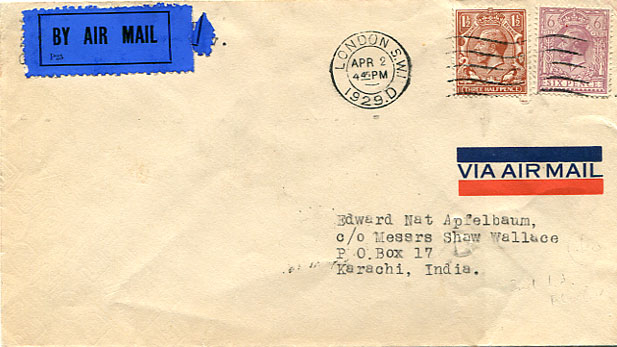
a) Second Flight IE2 April 1929
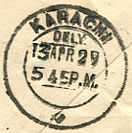
This cover was sent on the second flight IE 2 of the UK - Karachi service. It is postmarked in London on 2 April and left Croydon on 6 April and arrived in Karachi on 13 April where it was backstamped at 5.45 pm.
Many covers on the first flight were philatelic while covers
like this showed that the service was of use for commercial mail.
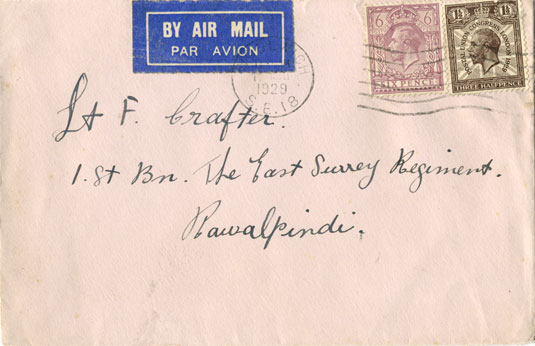
b) Letter to British Officer in India, IE8 May 1929
The British Government felt that the service was of stragic importance and that improving communications to India was important in strengthening the Empire.

This included improving communications between British soldiers based in India and their families back home.
This is such a cover, correctly franked with 7½d, and sent to an officer
based with his regiment in Rawalpindi.
It is postmarked 17 May and was flown on the
8th outward flight IE8 leaving Croydon
on 18 May and arriving in Karachi on 25 May [3].
It is backstamped at Rawalpindi on 27 May.
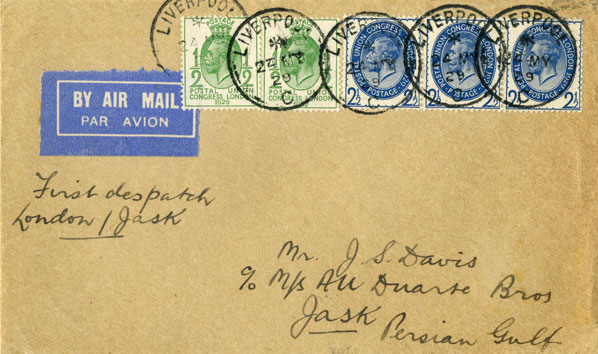
c) First acceptance for Jask, IE9 May 1929
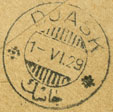
This cover to Jask is inscribed First dispatch London / Jask and is postmarked 24 May 1929 in Liverpool.
It was flown on IE9 and left London on 25 May arriving in Jask on 31 May [2]. It is backstamped Djask on 1 June.
The franking is 8½d which is made up of 2½d surface rate to a foreign country plus 6d air fee to the Persian Gulf Ports [1]. This was announced in an Air Mail Leaflet issued on 19 May.
As evidence that previous services did not accept mail to be flown all the way to Jask,
I have seen a cover to Jask on the first flight IE1.
It was offloaded in Basrah where it was backstamped on 5 April.
It was then sent on by surface and has a
Muscat transit on 12 April and a Djask backstamp on 17 April.
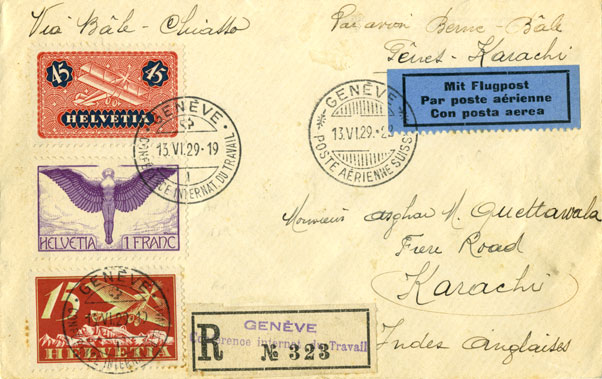
d) Switzerland - Karachi, IE12 June 1929
As the first part of the route was London - Basle by plane followed by Basle - Genoa by train, it was straightforward for mail to be accepted from Switzerland.
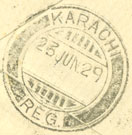
This cover is postmarked on 13 June in Geneva from where it
would go to Basle by train and join IE12
on 15 June.
The flight arrived in Karachi on 22 June, but was 5 hours late [3]
and so the cover was not backstamped until the following day.

e) London - Karachi - (Australia), IE15 July 1929
The first official acceptance of air mail for Australia and New Zealand via the Karachi service was not until IE 23 on 31st August.
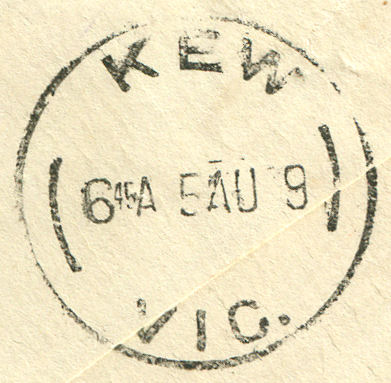
This cover is postmarked in London on 5 July and is routed, and has the correct franking, to be flown
to Karachi.
It is backstamped at Kew, a suburb of Melbourne, on 5 August and to have
arrived by that date, it must have been flown
to Karachi on IE15 on 6-13 July from where it was sent by
surface to Colombo.
It was then taken by sea to Fremantle on the Narkunda on 21-31 July before going
taken by rail to Melbourne.
Later Return Flights
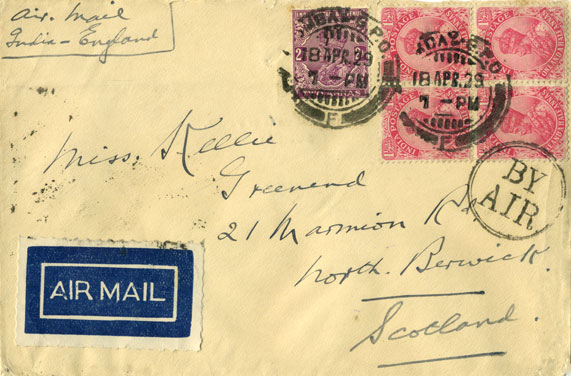
Bombay to Scotland, IW3 April 1929
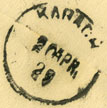
The first is postmarked in Bombay on 18 April 1929, has a Karachi transit mark on 20 April and is addressed to North Berwick. It is therefore likely to have been flown on the third service which left Karachi on 21 April and arrived in London on 28 April.
It is franked with stamps to the value of 8 annas. The air mail fee from India was 6 annas in addition to a surface fee of 2 annas [3].
It was the DH 66 City of Baghdad that departed with the mail from Karachi,
but it was the DH 66 City of Teheran that arrived in
Cairo, two days late [3].
There was clearly some problem along the way.
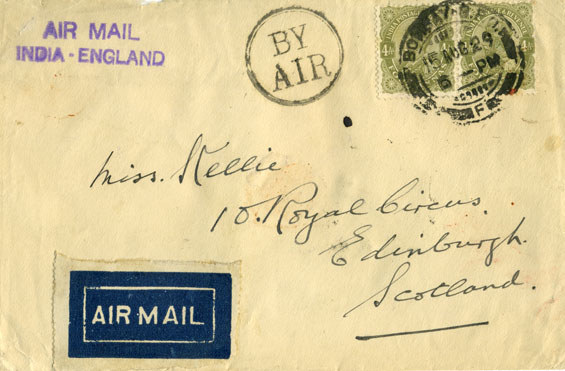
Bombay to Scotland, IW20 August 1929
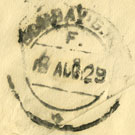
The second is also from Bombay and is to the same person as the previous cover. It is postmarked on 15 August 1929 and is addressed to Edinburgh.
It is therefore likely to have been flown on service IW20 which left Karachi on 18 August and arrived in London on 25 August.
It is correctly franked with 8 annas.
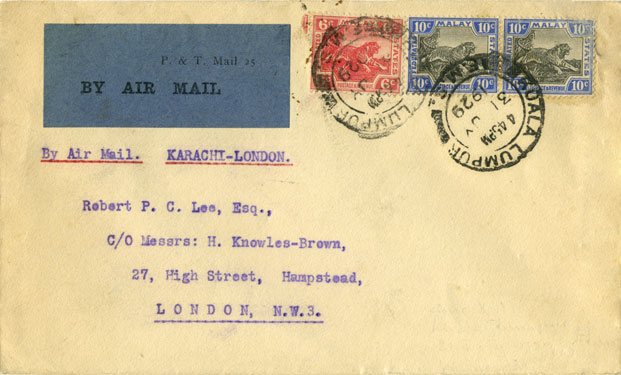
First Acceptance from Malaya, IW 19 August 1929
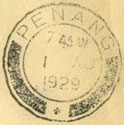
Reeves [4] describes how the first acceptance was sent by steamer from Penang to Calcutta on 2 August and that this was the beginning of a fortnightly service. The transit time was 16 days which was a saving of 5 days. This was reported in The Straits Times of 25 July 1929.
This cover from Malaya to the UK with Karachi - London routing is postmarked on 31 July in Kuala Lumpur and on 1 August in Penang and so was sent on the first acceptance. It is franked with 26c made up of 20c air fee plus 6c ordinary postage. I have seen other similar covers in auctions including one with a 19 August backstamp in the UK.
That means that the covers
were flown from Karachi to London on IW 19 on 11 - 18 August
which fits with the transit time of 16 days.
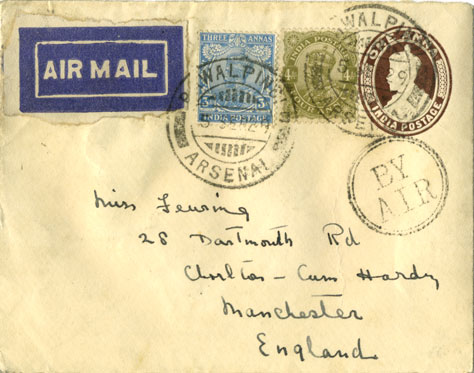
From Rawalpindi, IW23 September 1929
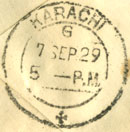
This cover is postmarked Rawalpindi Arsenal on 5 September and has a Karachi transit mark on 7 September. It would be flown on IW23 which left Karachi on 8 September and arrived at Croydon on 15 September.
The cover is postal stationary printed with 1 anna which has had 7 annas added to make the airmail rate to the UK.
Rawalpindi is in the Punjab and was the Headquarters of the Northern Command and
had the largest British garrison in India.
This is therefore a letter home from a British soldier in India.
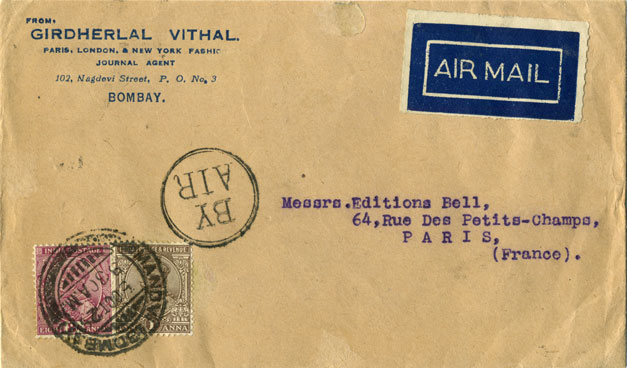
Bombay - Paris, IW28 October 1929
This cover was postmarked in Bombay on 5 October and backstamped in Karachi on 7 October.
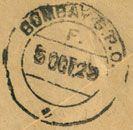
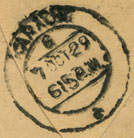
Service IW27 left Karachi on 6 October and so this cover would have been flown on IW28 which left on 13 October [3]. As it is addressed to Paris, it was presumably off-loaded there on 20 October as the final leg was Basle - Paris - London.
It is franked with 9 annas as the surface rate from India to non-Empire countries was 3 annas in addition to the air fee of 6 annas.
During the following service IW29, the Short Calcutta flying boat City of Rome was forced to land on the sea in a storm after taking off from Naples. She sank, killing the crew of 3 and the 4 pasengers. All the mail was lost.
On the next service IW30, the mail was carried by sea from Alexandria
to Genoa due to the lack of flying boats.
The above cover was therefore carried on the last westward service in
which the mail was flown between Egypt and Genoa before the change
of route to one through central Europe.
Change to route
The route from London to Egypt changed several times in the
first few years due to problems between the British and Italian
governments.
During 1929, the flights from Croydon on 13 and 20 April did not land
at Tobruk [3] and then in October some flights
landed at Mersa Matruh (Egypt) instead of Tobruk which was under
Italian control.
In November, a further change was made so that the
route was now through central Europe.
All scans were made by the author.
Information on this page is taken from:
Airmails of New Zealand, volume 2 (1986) compiled by
Douglas A Walker, and
The New Zealand Airmail Catalogue, (2nd Edition, 1994)
by James Stapleton.
Both are published by the
Air Mail Society of New Zealand
[1] A S Newell, British External Airmails until 1934,
(second edition) 1996.
[2] E B Proud, The Postal History of British Air Mails,
Proud-Bailey, 1991.
[3] Aircraft Movements on Imperial Airways' Eastern Route,
Vol 1, 1927 - 1937, Peter Wingent, Winchester 1999.
[4] Malayan Air Mails: 1929, W.A. Reeves, The Malayan Philatelist, Vol. 20, p. 3, Jan-Feb 1979.